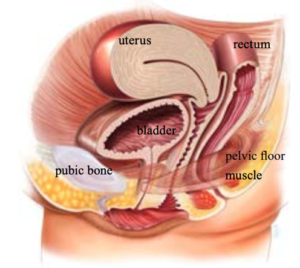Excess Weight
In this Health Topic

The pelvic floor supports the pelvic organs and is under constant pressure from the weight carried by the body. When there is excess weight gain, there is a proportionate strain on the pelvic floor potentially causing damage of muscles, nerves and tissues. This can result in symptoms of pelvic floor disorders like leakage of urine, stools and or a vaginal bulge (prolapse).
Body Mass Index (BMI) is an approximate measure of weight to your health. It is calculated by measuring your weight in kilograms to your height in meters. A healthy BMI range from 18.5 to 24.9. When the BMI is 30 and above, it is called obesity and over 40 is severe obesity. Obesity is a common problem affecting 1-2 in 10 men and women. Obesity is also a serious health concern, associated with higher risk of other medical problems like diabetes, heart disease, certain cancers, stroke and even contribute to poor mental health. Obesity is a risk factor for pelvic floor disorders.
Weight gain in certain individuals can be attributed to strong genetic factors, and it is not always solely caused by poor diet or lack of exercise.
- Bladder symptoms
Obesity significantly increases the likelihood of experiencing urine leakage, with a 4-5 times higher risk. Even a modest increase of 5 units in BMI can elevate the risk by 20-70%. This applies to both stress urinary incontinence (leakage with physical exertion like coughing) and urgency urinary incontinence (leakage with urgent urination). Furthermore, obesity is associated with a greater chance of leakage recurring after surgery for stress incontinence as well as longer surgical duration and increased blood loss. Additionally, there is an association between obesity and heightened symptoms of overactive bladder including increased urinary frequency and urgency.
- Pelvic organ prolapse
Prolapse is the bulging or herniation of one or more pelvic organs into or outside the vagina. There is a higher chance of having prolapse symptoms with obesity. The risk increases with the severity of obesity and there is a higher chance of worsening of prolapse with time.
- Bowel symptoms
Patients with obesity does not have any more constipation than the general population with normal weight. However, there is some evidence that the additional strain due to excess weight can increase leakage of stools.
- Sexual function
Obesity often leads to various challenges in women’s sex lives. These difficulties can arise from multiple factors, such as the impact of obesity on bladder and/ or prolapse symptoms, mood, and body image.
Losing weight can greatly decrease urinary incontinence, whether it is caused by stress or urgency. Even a 5% weight loss can lead to a remarkable 50% decrease in stress urinary incontinence episodes. Non-surgical methods like diet, exercise and medication have proven effective in reducing leakage by 40-50% in cases of stress urinary incontinence, providing a way to manage it without surgery. Additionally, weight loss has been associated with a significant 73% reduction in symptoms of overactive bladder, a condition characterized by frequent and urgent need to urinate.
In the early stages of prolapse, weight loss plays a beneficial role in improving symptoms and preventing the progression of prolapse. However, in the advanced stages, weight loss may not directly improve prolapse symptoms or the stage of prolapse. Nonetheless, weight loss can help decrease the risks associated with surgery and anesthesia, such as an increased risk of blood clots in the legs and lungs that can occur during prolapse surgery. Additionally, weight loss surgery has been reported to lead to improvements in bowel symptoms and sexual function. It is important to note that weight loss offers other advantages as well, including a reduced risk of diabetes, along with a decreased likelihood of other medical problems and even a lower risk of early death.
We understand that weight management can be a sensitive topic, especially if you have tried various approaches in the past. The key is to have an open and honest conversation with your doctor, who can guide you in setting realistic goals and attainable weight loss targets. Typically, aiming for a 5-10% reduction from your baseline weight is a reasonable starting point, and even a 5% decrease can lead to improvements in pelvic floor function. Together with your healthcare provider, you can explore effective strategies to overcome obesity and improve your overall well-being.
- To assess underlying causes and potential medical causes related to obesity, consult your general practitioner. They may measure your blood pressure and order blood tests as part of the evaluation process.
- Identify potential reasons for weight gain by discussing eating patterns, physical activities, past experiences and both challenges and successes encountered in your weight management journey.
- Comprehensive weight loss programs that incorporate dietary habits, physical activity and behavior change along with support from health care professionals such as dieticians, exercise physiologists and lifestyle coaches can aid in achieving weight loss and maintaining it for 12-18 months.
- Before considering any specific diets, it is important to consult your doctor, especially if you are pregnant, lactating or have conditions such as diabetes, heart disease or kidney disease. While many diets exist with varying energy levels and rates of weight loss, very low energy diets (800 Cal/d or 2000- 4000 KJ/d) can be effective for achieving rapid weight loss prior to surgery or achieving 10-15% weight loss within 8-20 weeks. However, sustainability and individual suitability should be carefully considered.
- Exercise plays a crucial role in weight loss and maintaining muscle strength during the weight loss journey. While aiming to lose weight it is essential to prioritize safety and consider specific needs. In the elderly, low impact activities like walking, water aerobics or stationary cycling can be beneficial for cardiovascular health without putting excess strain on joints. Strength training exercises using light weight resistance bands under the guidance of a qualified professional like an exercise physiologist, can help preserve muscle mass and strength. Younger and more capable adults are recommended to engage in 150 minutes of moderate to vigorous intensity aerobic physical activity per week. It is crucial to work closely with healthcare professionals to create an exercise plan that is safe, manageable, and tailored to the individuals’ capabilities and limitations. Additionally, local services such as walking or gardening groups can provide additional support to increase physical activity and maintain healthy habits.
- When used in conjunction with dietary changes, medications can be helpful for weight loss. Your doctor can prescribe various types of medications including tablets and injections to aid in your weight loss journey.
- Bariatric surgery can be an effective option for achieving substantial weight loss. However, it is important to note that this procedure may not be suitable for everyone. It should be carefully considered after having a thorough discussion with your multidisciplinary healthcare team to assess its appropriateness for your specific circumstances.
- It is recommended to have regular weigh-ins every two weeks to monitor and review your progress effectively. This allows for ongoing assessment and adjustment of your weight loss journey.
The surgical outcomes of pelvic floor surgery, specifically for stress urinary incontinence and prolapse, may vary between obese and non-obese women. Studies suggest that obese women may have higher rates of postoperative complications including wound infections, healing issues and higher likelihood of recurrent prolapse or incontinence symptoms compared to non-obese individuals. However, it is important to note that individual factors and surgical techniques also play a significant role in determining outcomes. It is recommended to consult with your health care provider for a personalized evaluation and discussion of potential risks and benefits based on our specific situation.
